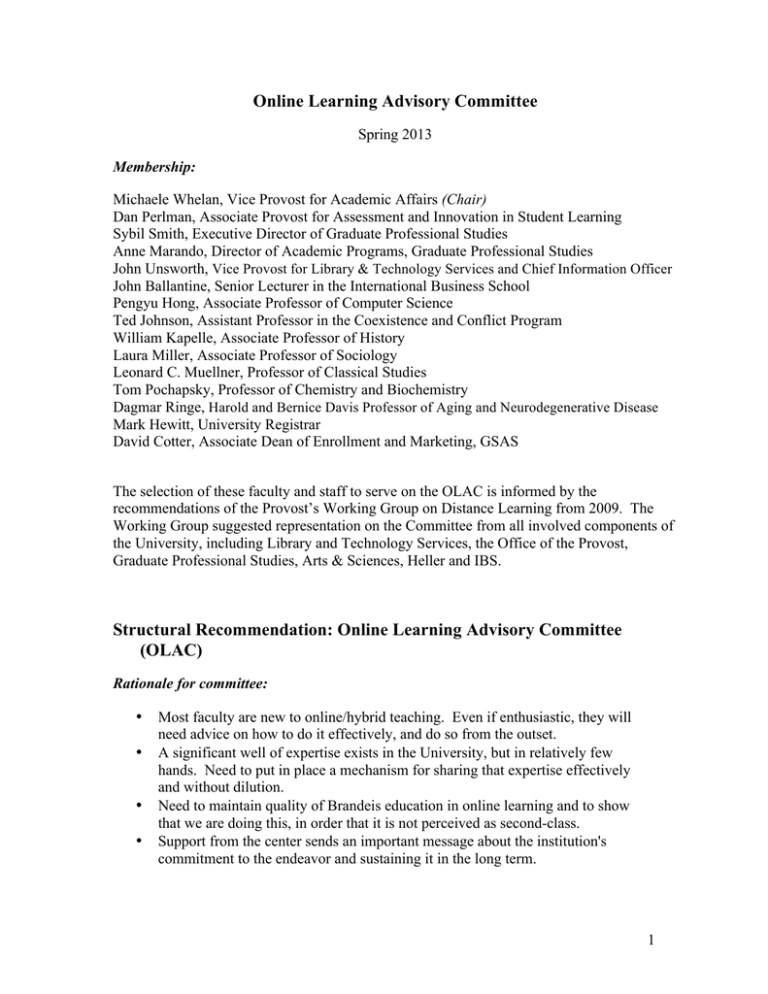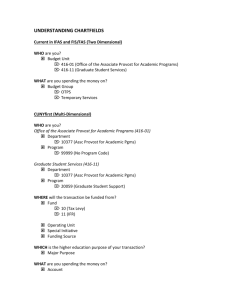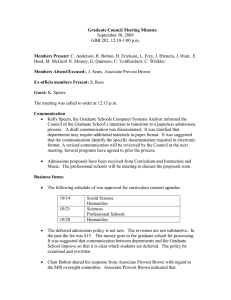Online Learning Advisory Committee
advertisement

Online Learning Advisory Committee Spring 2013 Membership: Michaele Whelan, Vice Provost for Academic Affairs (Chair) Dan Perlman, Associate Provost for Assessment and Innovation in Student Learning Sybil Smith, Executive Director of Graduate Professional Studies Anne Marando, Director of Academic Programs, Graduate Professional Studies John Unsworth, Vice Provost for Library & Technology Services and Chief Information Officer John Ballantine, Senior Lecturer in the International Business School Pengyu Hong, Associate Professor of Computer Science Ted Johnson, Assistant Professor in the Coexistence and Conflict Program William Kapelle, Associate Professor of History Laura Miller, Associate Professor of Sociology Leonard C. Muellner, Professor of Classical Studies Tom Pochapsky, Professor of Chemistry and Biochemistry Dagmar Ringe, Harold and Bernice Davis Professor of Aging and Neurodegenerative Disease Mark Hewitt, University Registrar David Cotter, Associate Dean of Enrollment and Marketing, GSAS The selection of these faculty and staff to serve on the OLAC is informed by the recommendations of the Provost’s Working Group on Distance Learning from 2009. The Working Group suggested representation on the Committee from all involved components of the University, including Library and Technology Services, the Office of the Provost, Graduate Professional Studies, Arts & Sciences, Heller and IBS. Structural Recommendation: Online Learning Advisory Committee (OLAC) Rationale for committee: • • • • Most faculty are new to online/hybrid teaching. Even if enthusiastic, they will need advice on how to do it effectively, and do so from the outset. A significant well of expertise exists in the University, but in relatively few hands. Need to put in place a mechanism for sharing that expertise effectively and without dilution. Need to maintain quality of Brandeis education in online learning and to show that we are doing this, in order that it is not perceived as second-class. Support from the center sends an important message about the institution's commitment to the endeavor and sustaining it in the long term. 1 Nature of committee: • • • • Advisory. But working to a series of well articulated guidelines that seek to uphold Brandeis educational standards in the online space. Course assessment limited to design of online and hybrid pedagogy (content to be approved through the same channels as all other courses, but courses with online content will be sent to this body for review and feedback). Curricular control to remain the prerogative of individual academic units and designated standing committees. Not a policy-making committee; tasked to recommend both to the standing committees such as the Undergraduate Curriculum Committee, the Graduate Council and the Graduate Professional School Council, as well as to the Provost. Function and scope of the committee to be communicated clearly to the community, in particular its advisory nature. Responsibilities of the committee: 1. To draw up and promulgate guidelines for best practices in online learning. • Deploying the collective expertise of the University, in particular Graduate Professional Studies. • Regularly reviewing the guidelines in light of experience, trends and university-supported technology. 2. To assess pedagogy of proposed online courses and advise faculty on implementation of best practices. • Scrutinizing design of individual courses proposed for online/hybrid treatment. • Advising faculty on implementation of best practices. • Advising faculty on training opportunities. 3. To act as an advisory body to the administration on the future development of online learning at the University. • Drawing on experience of faculty interactions, course scrutiny, student feedback etc. to gain insight into trends, faculty interests, motivations, involvement, opportunities for structured growth. • Monitoring effectiveness of academic, training, and technology resources available to faculty teaching online. 2 Avenues to Alerting the committee about DL courses: The committee spent some time discussing the processes by which it would hear about DL courses. Since DL is expected to evolve organically, there is a variety of methods by which such a new course could come to the committee’s attention. All listed below could function as sources for referrals to the committee: • • • • • • Memo from provost to the community about the committee’s formation Deans who are often first approached about new curricular ideas Chairs in A&S present 3-year curricular plans Traditional bodies such as UCC, the Graduate Council, the Graduate Professional School Council Registrar’s form indicating what kind of classroom is sought for the following year (perhaps a section could be added indicating hybrid, DL, etc. . .) LTS contacted by faculty for help with software. In all cases, faculty should be asked to describe to the committee the type of DL effort involved, how this integrates with the course, and what type of support and software they are expecting. For a new course or program, ideally this process of consulting with the committee should occur sooner in the process rather than at the end. In addition, there will need to be a way to code a course as DL within Peoplesoft so that tracking and archiving of courses can occur. In keeping with GPS policy, a course should not be distinguished as DL on the transcript since the delivery mode does not change the quality and type of course. Over time, the committee itself could report out to the community about the number and type of DL or hybrid courses or webinars occurring across the University. 3


